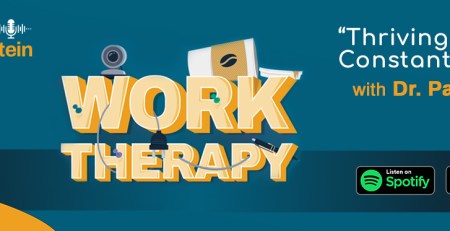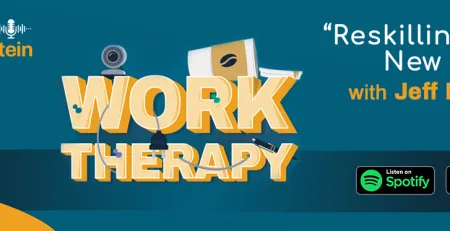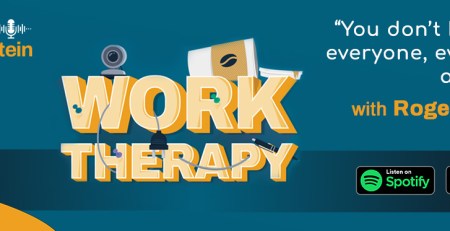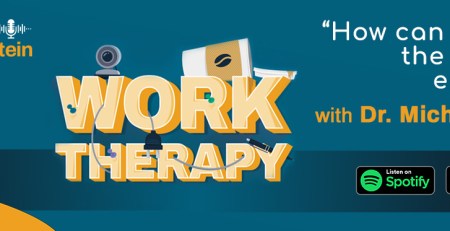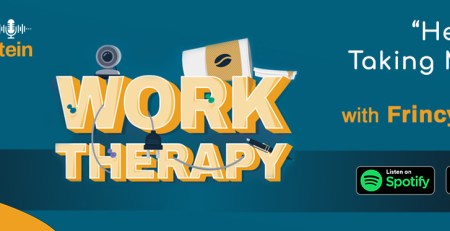Work Therapy: How being more emotionally intelligent benefits your bottom line
In this week’s episode of Work Therapy with Dr. Steven Stein, we chat with Denny Faurote, founder of the Faurote Group and a personal trainer, consultant, and executive coach with a background in MHS’ Emotional Quotient-Inventory 2.0® (EQ-i 2.0®).
Denny shares his knowledge of the power of emotional intelligence (EI) and how we can engage with the concept of EI meaningfully in the workplace.
DR. STEIN: How do you approach emotional intelligence in your workplace? Is the rest of your team on board with that approach? You won’t have much luck building out an emotional intelligence program if you don’t share a common understanding of how to work on emotional intelligence together and why it matters. If you’ve been trying to explain this to your team and they still don’t seem to get it, the trick may be in letting them figure it out for themselves.
DR. STEIN: I’m Dr. Steven Stein. I’m a clinical psychologist and founder of MHS, a leading developer of innovative scientific assessments in the talent development space and beyond. I’m here to tell you that work sucks sometimes. It does. I can admit it, but it doesn’t have to. In Work Therapy, we speak with experts from diverse backgrounds helping us wade through some of the most common issues people have on the job. We learn how to go beyond just surviving at work and learn how to start thriving because if work sucks, how can we fix it?
DR. STEIN: In today’s episode, return on investment, how being more emotionally intelligent benefits your bottom line. I spoke with Denny Faurote. I’m sure you’ve heard of emotional intelligence or EI, but what exactly is it and how do we engage with the concept of EI meaningfully in the workplace? Denny is the founder of the Faurote Group. He’s a professional trainer, consultant, and executive coach with a background in MHS’s EQ-i 2.0. Denny’s creed is to help others succeed in the challenges of life.
DR. STEIN: Hey there, Denny. It’s great to see you again. Thanks for doing this with us.
DENNY: Absolutely, Steven. It’s been a while.
DR. STEIN: So, as you probably know, the name of this show is called Work Therapy: When Work Sucks, How Can We Fix It? So, what I want to ask you to start off is why does work suck so much for so many people and how do you think we can fix it?
DENNY: That’s a great question. I do believe that the connectivity piece with the human relationships has been so difficult with the pandemic and as we come out of the pandemic, that it’s just really caused a lot of issues with individuals and really trying to figure out how they become more engaged in what it is that they’re doing.
DENNY: I just had a call yesterday with a leader in an organization that is struggling mightily with emotional intelligence. As a leader, he’s not real engaged himself and struggling, and his outlook is quite negative. Steven, I think really the interesting thing here for me, and I don’t know if you’ve seen this on your end, but since the pandemic and what we’ve seen with a lot of leaders and managers and then, of course it, trickles down within the organization, is that self-actualization is going down. People aren’t having as much fun, they’re overworked, and they’re doing things several levels below what their level is because they don’t have the resources. We also see stress tolerance going down and the stress, of course, is going up and then optimism coming down. And so, what I was able to help him understand is, as we look at self-actualization and optimism and how those might be connected, how do we start to drive that self-actualization up? How do we find and position you to have more of that fulfillment that you used to have?
DR. STEIN: Okay. So today we’re going to be actually zeroing in on that, focusing on the area of emotional intelligence, and we know where we hear a lot about it making you be a better leader, a better colleague. We hear about how it benefits the bottom line of an organization and you and I know a lot about this area, but let’s start with a very brief definition and we’ll hear your definition of emotional intelligence just so that we get everybody on the same page.
DENNY: Overall, for me, it’s really about understanding ourselves and others and the role that emotions play and our ability to build relationships, manage our own emotions, self-regulate, as well as how well do we handle the stressors in our lives. And when I talk to people, I really try to help them understand that it’s really about self-awareness and self-regulation and using emotions to help us build relationships and be our best selves throughout the day.
DENNY: I think people are coming to the awareness that emotional intelligence is not the fluffy stuff. It’s not the being nice all the time, but it really is the differentiator in our lives. And I think with the pandemic, us not being able to communicate as effectively that is being side by side with each other, that we’re really looking at ways to connect with people and understand ourselves better. And I think where we are today that if we can help people understand really what emotional intelligence is, that it’s not that fluffy stuff and it really is at the core of driving our performance and overall better health, I think that’s why it’s so much in need today why organizations are understanding the power of it. But once we can help them understand the power behind emotional intelligence, they latch onto it and really want to know how they can make it more part of their culture and how they do business.
DR. STEIN: Okay. So, let’s talk about a part of this that you’re involved with. You’re involve with training, with actually training organizations and people in this area, and we’ve all had to sit through training programs that we don’t want to be in. Sometimes it’s like watching paint dry. In terms of what you’ve seen, why does some EI training programs work, and others just don’t?
DENNY: I think there’s several things that happen as to why they don’t work. One is if the leadership doesn’t buy into the need for emotional intelligence or they’re just trying to check a box because they heard it’s the flavor of the month, if you will. And of course, if it’s not going to be successful if it’s just a flavor of the month or a new initiative that dies out. The other thing that I’ve found is organizations will say, “Well, we’ll give it 30 minutes. We’ll give it an hour to educate people on what emotional intelligence is.” And of course, as you know, that’s not going to do the trick with it.
DENNY: So, one of the things that I like to help clients understand is that you have to make a commitment to make this part of your culture. It’s just a check the box mentality. Oh, we did train on emotional intelligence, let’s move on, and there’s no follow-up, there’s no stickiness to it, if you will, and they don’t get any traction. And of course, when that happens, there’s no accountability with it. So, I think when it fails is there’s truly not that commitment from the leadership or the other thing that I have found with organizations that we go in and work with that maybe have tried to do emotional intelligence is that the facilitator or the trainer is saying, “Here’s why you need to do it. Here’s what it is.” Instead of going through the self-discovery as part of the facilitation so that the audience members are the ones that are coming to the conclusion that this is important. And then that makes it very easy for a facilitator, trainer to come in and say, “Okay, let’s figure out how to become better at this as we move forward.”
DR. STEIN: Okay. So, you’re going through an organization, you’re meeting the people, you’re talking to them, and you come across someone who’s clearly struggling with a variety of work issues, but you can assess it and you see that obviously this person is having some issues around their emotional intelligence. How do you approach it? How do you deal with that person?
DENNY: A couple of things come to mind when you ask that question. And so, if somebody’s been through a workshop with us and they understand emotional intelligence deeper because they’ve been through this workshop, it’s easier to initially have those conversations with people around that. If they haven’t done that, one of the things, of course, that we do is we administer the EQ-i 2.0 assessment for the individual to help them start to see maybe where their issues are arising from and how do we tie it back to emotional intelligence. And one of the things we’ve also seen with that as we coach people, they’re afraid to have the tough conversation with people because it’s so hard to find people today. But it’s really the exact opposite of that is if we’re not honest with people, there’s more of a disconnection there.
DR. STEIN: So why don’t we go with an example? Let’s say you’ve got someone who’s listening and they’re thinking, “I don’t need this. I’ve got it all. I’m the whole package.” And you know that there’s issues around that person. As a leader, what do you say to that person who thinks really, they’re at the top of their EI game, you can’t teach me anything at this stage?
DENNY: Well, it’s so interesting that you say that because, of course, we run into that all the time, and the longer someone’s been around, they’re going to say, “I’m a leader. I got here for a reason.” And what I try to usually tell people in a very gentle way is you got there despite yourself, and there’s so much more that we can learn. Even though I’ve been studying and reading about emotional intelligence for 30 years, it was like, “Oh my gosh.” It was like the lights went on for me is like my emotional self-awareness isn’t as strong as I thought. I had some other issues going on.
DENNY: So, what I try to do is ask a lot of questions of people to understand where they’re coming from, but then to point out even my own discovery of myself, because a lot of people will say, “Oh, you probably really have a high emotional intelligence because you do this all the time.” Like, you know what? It’s a snapshot in time and there’s things in our lives that can be impacting it. And I go through, and I share stories about my learning to help them understand that no matter where you are, we can always learn.
DENNY: And so, as we go through that, I’ll ask people, what are the characteristics of your best leaders that you’ve ever had? What are the characteristics of your worst leaders? And I love doing this exercise because everything they come up with as the best and the worst are emotionally intelligence related. So, it’s then to point out. You just came up with what the best is going to be is going to be someone that’s high and effective in usage of emotional intelligence. And what you just described about yourself and some of the issues you have or struggling with, it’s emotionally intelligence related. And so, when they can make that connection, then they start to open up about it a bit because quite honestly, I think some of those folks even want to try to get them to take the assessment. They’re a bit reluctant to do it because I think they’re afraid to see what their scores might be.
DR. STEIN: So, we’ve got people listening to us out there hearing about these skills and how and why they’re important. And maybe they’re starting to think, “You know what, maybe there are a few things I’m lacking. Maybe there’s some ways that I should improve myself.” What do you think they should do? Where should they start? How should they go about approaching this?
DENNY: Well, as they think about it, a couple thoughts come to mind. If there’s somebody within an organization, of course, does their company offer any type of training around emotional intelligence that they could connect with? Steven, I’ve used the EQ-i 2.0 now for 12 years. And yes, I am biased because it’s such a great instrument, but maybe take the assessment, get some coaching around it to really start that process moving forward.
DENNY: Up until 12 years ago, we, the Faurote Group never used an emotional intelligence assessment. And the reason is I didn’t think there’s anything on the market that was of value, that would truly help our clients out to understand themselves, be able to put a plan together and really improve their EI. When I took the assessment 12 years ago, I took the assessment at the end of January of that particular year. I was certified as a coach by the end of February that year because it was so powerful. It is real, and it’s what makes a difference.
DENNY: I was with a client three weeks ago, Steven, and had a full day with this group of leaders and managers. There are a hundred of them. All of them took the assessment and they did it before the workshop and the night before the session that I was doing, they were there the day before and doing some leadership stuff and their leader of their organization asked, the group was talking about what’s going on tomorrow? It’s about emotional intelligence. And he had literally asked the question, he said, “How many of you are thinking emotional intelligence? How can we do eight hours on this?”
DENNY: I’m looking around the room and there’s at least 60% of the people raise their hands like. How in the world can we talk about this for eight hours? The beautiful thing about that for me at the end of the next day on Thursday is to a person. People said, “This was awesome. I wish I would’ve had this 30 years ago before I started my career.” And so, when people can get introduced to it and understand it, that’s where you start. And I can’t talk highly enough about emotional intelligence and this model in all honesty because it has been a game changer for me and the clients that we serve as well.
DR. STEIN: I want to zero back into something that you touched on before, and we hear a lot of talk now about developing the whole person. And I think you mentioned a bit when you talk about self-actualization and some of the examples. Talk a little bit about what it means to develop the whole person and why that’s so important right now.
DENNY: In May of 2019, so just think about the date of May 2019 and the relevance here. The World Health Organization came out with the fact that burnout is now considered a medical condition. That was May of 2019. So that was pre-pandemic, and it’s just gotten worse since then. So, when we look at the whole person and the wellbeing and how we help those individuals, I look at that from the physical, the mental, the emotional, the spiritual, and the social side of things. How do we look at those individuals to help them become more well-rounded? And we look at every aspect of their life because we know that in those areas of our lives if we’re not taking care of ourselves and really recognizing the importance of the whole person? We’re missing a tremendous opportunity because if we don’t focus on the whole person, in my mind, it’s almost like having a partial flat tire.
DENNY: You look at five areas and you say, “Hey, I’m only going to work on two of these, and you have the other three that are flat.” It’s still going to be a very bumpy ride for that person. So, I think organizations really need to take a step back and say, “How do we look at the whole person?” And that’s one of the other things I love about the model that we utilize here because it measures wellbeing. You take a step back, you look at self-actualization, you look at optimism, you look at the interpersonal relationship sides of things as we measure those pieces. And I just think the more we connect with people as a whole person, we’re going to help them be much more successful in every aspect of their lives.
DR. STEIN: Well, it’s great listening to some of the success experiences that you’ve had in this. And can you just summarize some of the things you’ve seen, some of the changes, the positive gains as a result of this training implementation in organizations, large or small? What have you seen across the board?
DENNY: For us, what we’ve seen is definitely greater engagement amongst people that they really start to understand each other better. We definitely have seen performance with those individuals that take it seriously. And that’s the fun thing for us because we can see that growth and development that people have. We see people getting promoted into new roles because of the fact that not only are they going through the programs, but they’re improving their usage of these sub-skills that we talk about through emotional intelligence.
DENNY: The other thing that we’ve seen with this, and I’m not the expert on this, but we’ve had clients tie it into it, is within the DEI space that if they can make emotional intelligence even foundational to the DEI training that they’re doing. Because as I look at that, I think one of the biggest issues that organizations have is a lack of understanding of others. And that gets into the empathy, the interpersonal relationships, the social responsibility elements of emotional intelligence. I can’t think of a downside that we’ve had with clients in doing this in all honesty. We can see how it drives teamwork, how it drives productivity, how it improves communication, and all those elements that organizations are looking for.
DENNY: But what I also tell people is how does this drive or improve on the technical side, the knowledge side? And initially people are like, “Well, you’re talking about emotional intelligence. It’s not the technical stuff.” But ultimately somebody will say, “Well, I can be the smartest person technically, but if I don’t have the ability to effectively communicate and understand others and understand the role that emotions play as I solve problems, make decisions, it doesn’t matter how smart I am.” So, we’ve seen that as well where people become more effective, even solving problems and understanding what might be getting in the way when they’re extremely technical, but they’re analysis paralysis type stuff, whether it’s driven by emotions or whatever’s causing that. There are so many areas where we see the improvement and help within organizations and individuals.
DR. STEIN: That’s great, Denny, I want to thank you so much for sharing your experience with us and all our listeners, and it’s been great having you on-board here and hope to see you again soon in person.
DENNY: Absolutely. I appreciate the time and keep up the good work.
DR. STEIN: Well, there you have it. I know my conversation with Denny Faurote has left me thinking about all the areas on a flat tire I might be missing, and how I can keep learning to spot them. Today, I want to leave you with these tips. Tip number one, don’t avoid having tough conversations because you’re worried about burning bridges. Be honest with others is how you fortify your connection. Tip two is trying to identify some of your own emotional intelligence strengths and growth areas by asking yourself when you felt most effective as a leader or a collaborator and when you struggled the most. And my final tip is for any leaders or anyone who ends up facilitating an EI training program, make sure to show and not just tell people the importance of emotional intelligence. Let them come to their own conclusion about how meaningful it is to get the most out of the experience.
DR. STEIN: If you’d like to learn more about the EQ-i 2.0, visit MHS.com. I’m Dr. Steven Stein, and I look forward to our next episode of Work Therapy. Let’s make work suck less together.
Have any feedback about this episode or want to learn more about MHS? Reach out to us at [email protected]
Click here to learn more about MHS’ EQ-i 2.0

